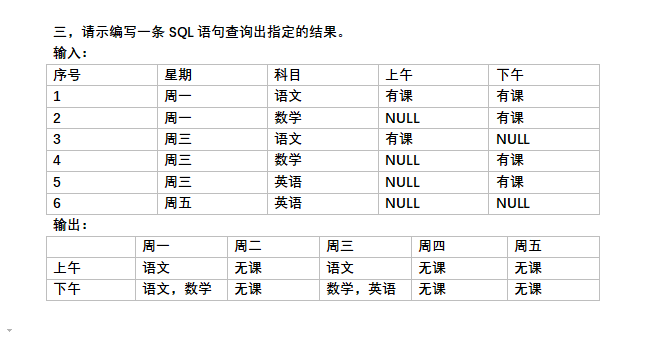可以将文章内容翻译成中文,广告屏蔽插件可能会导致该功能失效(如失效,请关闭广告屏蔽插件后再试):
问题:
I have an array:
$a = array(\'foo\' => \'fooMe\');
and I do:
print_r($a);
which prints:
Array ( [foo] => printme )
Is there a function, so when doing:
needed_function(\' Array ( [foo] => printme )\');
I will get the array array(\'foo\' => \'fooMe\'); back?
回答1:
I actually wrote a function that parses a \"stringed array\" into an actual array. Obviously, it\'s somewhat hacky and whatnot, but it works on my testcase. Here\'s a link to a functioning prototype at http://codepad.org/idlXdij3.
I\'ll post the code inline too, for those people that don\'t feel like clicking on the link:
<?php
/**
* @author ninetwozero
*/
?>
<?php
//The array we begin with
$start_array = array(\'foo\' => \'bar\', \'bar\' => \'foo\', \'foobar\' => \'barfoo\');
//Convert the array to a string
$array_string = print_r($start_array, true);
//Get the new array
$end_array = text_to_array($array_string);
//Output the array!
print_r($end_array);
function text_to_array($str) {
//Initialize arrays
$keys = array();
$values = array();
$output = array();
//Is it an array?
if( substr($str, 0, 5) == \'Array\' ) {
//Let\'s parse it (hopefully it won\'t clash)
$array_contents = substr($str, 7, -2);
$array_contents = str_replace(array(\'[\', \']\', \'=>\'), array(\'#!#\', \'#?#\', \'\'), $array_contents);
$array_fields = explode(\"#!#\", $array_contents);
//For each array-field, we need to explode on the delimiters I\'ve set and make it look funny.
for($i = 0; $i < count($array_fields); $i++ ) {
//First run is glitched, so let\'s pass on that one.
if( $i != 0 ) {
$bits = explode(\'#?#\', $array_fields[$i]);
if( $bits[0] != \'\' ) $output[$bits[0]] = $bits[1];
}
}
//Return the output.
return $output;
} else {
//Duh, not an array.
echo \'The given parameter is not an array.\';
return null;
}
}
?>
回答2:
If you want to store an array as string, use serialize [docs] and unserialize [docs].
To answer your question: No, there is no built-in function to parse the output of print_r into an array again.
回答3:
No. But you can use both serialize and json_* functions.
$a = array(\'foo\' => \'fooMe\');
echo serialize($a);
$a = unserialize($input);
Or:
echo json_encode($a);
$a = json_decode($input, true);
回答4:
For Array output with Subarrays, the solution provided by ninetwozero will not work, you can try with this function that works with complex arrays:
<?php
$array_string = \"
Array
(
[0] => Array
(
[0] => STATIONONE
[1] => 02/22/15 04:00:00 PM
[2] => SW
[3] => Array
(
[0] => 4.51
)
[4] => MPH
[5] => Array
(
[0] => 16.1
)
[6] => MPH
)
[1] => Array
(
[0] => STATIONONE
[1] => 02/22/15 05:00:00 PM
[2] => S
[3] => Array
(
[0] => 2.7
)
[4] => MPH
[5] => Array
(
[0] => 9.61
)
[6] => MPH
)
)
\";
print_r(print_r_reverse(trim($array_string)));
function print_r_reverse(&$output)
{
$expecting = 0; // 0=nothing in particular, 1=array open paren \'(\', 2=array element or close paren \')\'
$lines = explode(\"\\n\", $output);
$result = null;
$topArray = null;
$arrayStack = array();
$matches = null;
while (!empty($lines) && $result === null)
{
$line = array_shift($lines);
$trim = trim($line);
if ($trim == \'Array\')
{
if ($expecting == 0)
{
$topArray = array();
$expecting = 1;
}
else
{
trigger_error(\"Unknown array.\");
}
}
else if ($expecting == 1 && $trim == \'(\')
{
$expecting = 2;
}
else if ($expecting == 2 && preg_match(\'/^\\[(.+?)\\] \\=\\> (.+)$/\', $trim, $matches)) // array element
{
list ($fullMatch, $key, $element) = $matches;
if (trim($element) == \'Array\')
{
$topArray[$key] = array();
$newTopArray =& $topArray[$key];
$arrayStack[] =& $topArray;
$topArray =& $newTopArray;
$expecting = 1;
}
else
{
$topArray[$key] = $element;
}
}
else if ($expecting == 2 && $trim == \')\') // end current array
{
if (empty($arrayStack))
{
$result = $topArray;
}
else // pop into parent array
{
// safe array pop
$keys = array_keys($arrayStack);
$lastKey = array_pop($keys);
$temp =& $arrayStack[$lastKey];
unset($arrayStack[$lastKey]);
$topArray =& $temp;
}
}
// Added this to allow for multi line strings.
else if (!empty($trim) && $expecting == 2)
{
// Expecting close parent or element, but got just a string
$topArray[$key] .= \"\\n\".$line;
}
else if (!empty($trim))
{
$result = $line;
}
}
$output = implode(\"\\n\", $lines);
return $result;
}
/**
* @param string $output : The output of a multiple print_r calls, separated by newlines
* @return mixed[] : parseable elements of $output
*/
function print_r_reverse_multiple($output)
{
$result = array();
while (($reverse = print_r_reverse($output)) !== NULL)
{
$result[] = $reverse;
}
return $result;
}
?>
There is one tiny bug, if you have an empty value (empty string) it gets embedded in the value before.
回答5:
you cannot do this with print_r,
var_export should allow something similar, but not exactly what you asked for
http://php.net/manual/en/function.var-export.php
$val = var_export($a, true);
print_r($val);
eval(\'$func_val=\'.$val.\';\');
回答6:
There is a nice Online-Tool which does exatly what its name is:
print_r to json online converter
From a JSON Object its not far to creating an array with the json_decode function:
To get an array from this, set the second paramter to true. If you don\'t, you will get an object instead.
json_decode($jsondata, true);
回答7:
Quick function (without checks if you\'re sending good data):
function textToArray($str)
{
$output = [];
foreach (explode(\"\\n\", $str) as $line) {
if (trim($line) == \"Array\" or trim($line) == \"(\" or trim($line) == \")\") {
continue;
}
preg_match(\"/\\[(.*)\\]\\ \\=\\>\\ (.*)$/i\", $line, $match);
$output[$match[1]] = $match[2];
}
return $output;
}
This is the expected input:
Array
(
[test] => 6
)
回答8:
I think my function is cool too, works with nested arrays:
function print_r_reverse($input)
{
$output = str_replace([\'[\', \']\'], [\"\'\", \"\'\"], $input);
$output = preg_replace(\'/=> (?!Array)(.*)$/m\', \"=> \'$1\',\", $output);
$output = preg_replace(\'/^\\s+\\)$/m\', \"),\\n\", $output);
$output = rtrim($output, \"\\n,\");
return eval(\"return $output;\");
}
NB: better not use this with user input data
回答9:
use var_export(array(\'Sample array\', array(\'Apple\', \'Orange\')));
Output:
array (
0 => \'Sample array\',
1 =>
array (
0 => \'Apple\',
1 => \'Orange\',
),
)


